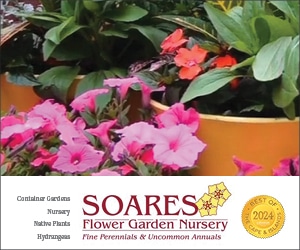
For the love of floribunda
Cape Cod Life / April 2018 / Home, Garden & Design
Writer: Julie Craven Wagner / Photographer: Cindy Ehrenreich
For the love of floribunda

Cape Cod Life / April 2018 / Home, Garden & Design
Writer: Julie Craven Wagner / Photographer: Cindy Ehrenreich

‘Daybreaker’ floribunda starts its journey as tangerine buds wrapped in pink and ultimately becomes a soft yellow cloud when fully opened.
This low-maintenance, high-reward rose is a true delight
Would a rose by any other name really be the same? In the case of floribunda roses, this discussion could go on for hours. These especially hardy and vigorous roses are perfectly propagated to become the workhorse in any garden. It is a common misconception that roses are finicky, fickle flowers; perhaps it is their universal presence in endless formal and sophisticated settings. The actual indulgence of raising the delicate species is far easier than might be imagined, but that is not to say that these queens of the garden don’t have a list of demands.
Roses generally thrive in the delicate, salty breezes that are common to the Cape and Islands. An old wives’ tale of rose care involves sprinkling Epsom salts around the roots each spring, and perhaps that is why coastal roses seem so happy. Another suggestion passed down is the reminder that roses don’t like “wet feet,” that is to say the base of the plant should be rooted in well-drained soil—the sandy nature of the Cape soil certainly encourages drainage. And it is true that the leaves of roses do require attention—mold, mildew and insects can destroy the leaves of a rose plant, thereby annihilating the ultimate prize: the bloom.
Fear not, there exists a species of rose that is easily encouraged to deliver the satisfaction and beauty that a gardener desires, but without the fuss and frustration. Floribunda roses are the result of crossing a hybrid tea rose with a polyantha rose. As a result, the species benefits from the quintessentially formed buds of a hybrid tea, with the profusion of blossom characterized by the polyanthas. They are fairly compact in their stature, most are between 24 and 40 inches in height, and rarely occupy more than 24 inches of precious garden space.

A hedge of ‘Iceberg’ floribunda roses makes a perfect backdrop for most Cape Cod architecture. ‘Heaven On Earth,’ a peach-colored rose, is a perfect accent to ‘Teasing Georgia,’ a yellow David Austin (not floribunda) rose.
“What I like about floribundas is the number of flowers on the plant,” says C.L. Fornari, the Cape’s foremost creative gardening expert. “These are not roses that were bred to grow a long stem with a perfect rose at the end of it. These were bred to have clusters of roses, and they just have more flowers, which makes them more satisfying in the landscape.”
These reliable beauties can hold court in the center of a perennial bed, line a pathway, or even command attention in an oversized pot. Their care needs are minimal: a bit of early spring light pruning, some fertilizer and some deadheading (the removal of spent blooms). In exchange, their showy blooms spill forward in massive clusters, with the individual flowers in various states of opening. They start out with several flowers that are tightly furled conical points of color, like the tip of Cupid’s arrow, and ultimately open, on the vine as well as in the vase, to reveal shallow cups of lush layers of velvety petals. This transformation makes it appear as though the sprays are made up of several different roses.
As a bonus, the species often offers fewer thorns, particularly as compared with other shrub-like species, and the heady scent rendered from most varieties is often described in terms usually reserved for fine wine, like honey, sweet apple, spicy and fruity. But perhaps their greatest contribution to the garden is their long blooming activity. Many varieties of roses are limited in their contribution based upon when they make their grand entrance—usually late June into July in this region. But most floribunda will start their show at the same time, and with small attention, they will continue to perform, usually until the first frost.
Fornari cautions gardeners to do a bit of research, since not all of the cultivars will fulfill the full season promise of blooms. “Not all floribundas are the same, and people should know that. There are floribundas that bloom once and not again and floribundas that bloom several times through the summer,” she says.
Choosing which variety to take home may be the hardest part of owning one of these beauties. Irwin and Cindy Ehrenreich of Barnstable have a long history of educating gardeners on a variety of roses, but they both say floribundas are definitely one of their favorites. Cindy says she might love ‘Daybreaker’ the most, due to the color range displayed during its bloom duration. “It starts out as a tight tangerine center,” she explains, “wrapped in soft pink outer petals, and by the time it transitions to being fully open, it has become a beautiful yellow in the center, like the color of a summer sunset.”

The popular Jackson & Perkins ‘Moondance’ floribunda is a perfect specimen to start a collection.
The Ehrenreichs have scores of clients around the Cape for whom they provide garden design and weekly maintenance for their roses. Irwin, a retired surgeon, is commonly referred to as “The Rose Man,” a name bestowed upon him while working for John Duffley at Hyannis Country Garden. “John would walk me around the garden center and introduce me to the clients and employees as ‘The Rose Man,’ and it just sort of stuck,” Irwin recalls.
The expansive gardens located at their home, the circa 1690 Sturgis homestead in Barnstable, boast over 600 rose bushes, and many of those are of the floribunda strain. One of the more famous strains, ‘Julia Child’ has an interesting background, as the Ehrenreichs tell it. “Tom Carruth, a very successful rose hybridizer from Weeks Roses in California, had been trying to work with Julia Child to name a rose for a very long time, but none of the presented roses were ever right. Then he developed a beautiful, deep butter-yellow floribunda that he showed her, and she fell in love with it—after all, we all know how she loved butter,” Irwin says with a chuckle.
Fornari confirms the great satisfaction these roses can deliver to most gardeners, but also cautions that, since our spring season tends to be wet and roses prefer a dry spring, “black spot,” a common condition that can affect any rose, can always be a problem. “People should realize that disease resistant should not mean disease impervious,” Fornari warns. “They can make a decision themselves whether to treat regularly for black spot and try to prevent it with the product of their choice, including organic options. But people need to understand if they want to treat, it has to be done before the plant gets it. Once you see yellowing, spotted leaves, it’s really too late to start spraying.”
Overall, the satisfying return on efforts invested when growing floribunda roses should not only keep gardeners searching for the next variety to add to their garden, but also allow for more time to just sit back and enjoy them. As Shakespeare suggested in “Romeo and Juliet,” “What’s in a name? That which we call a rose by any other name would smell as sweet.” When it comes to roses, if the name is floribunda, the experience should be as sweet as they come.




